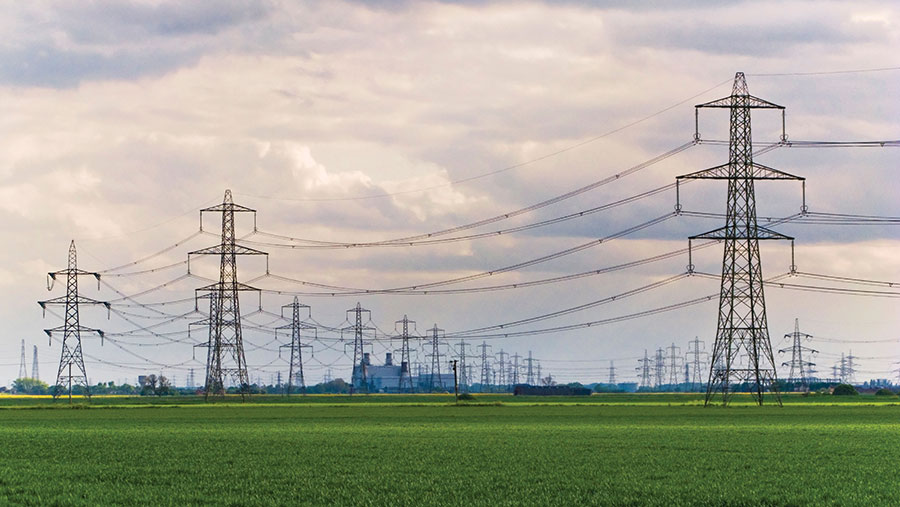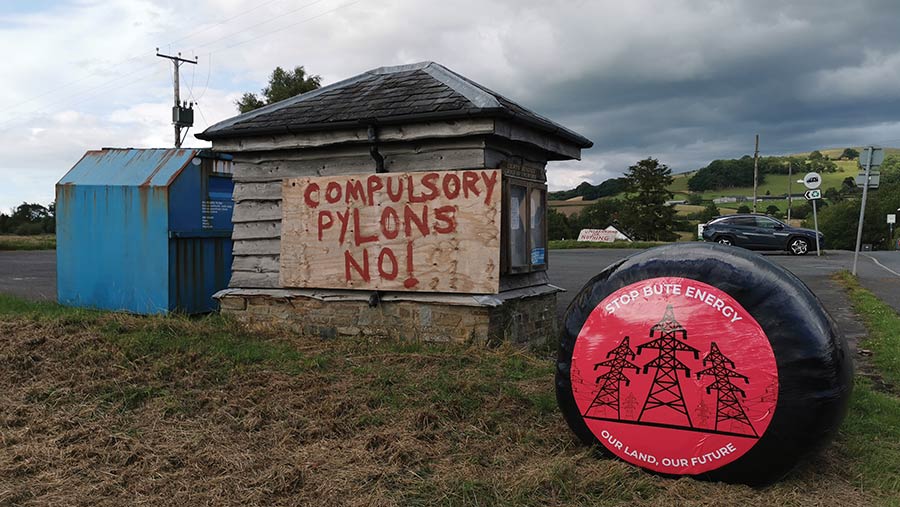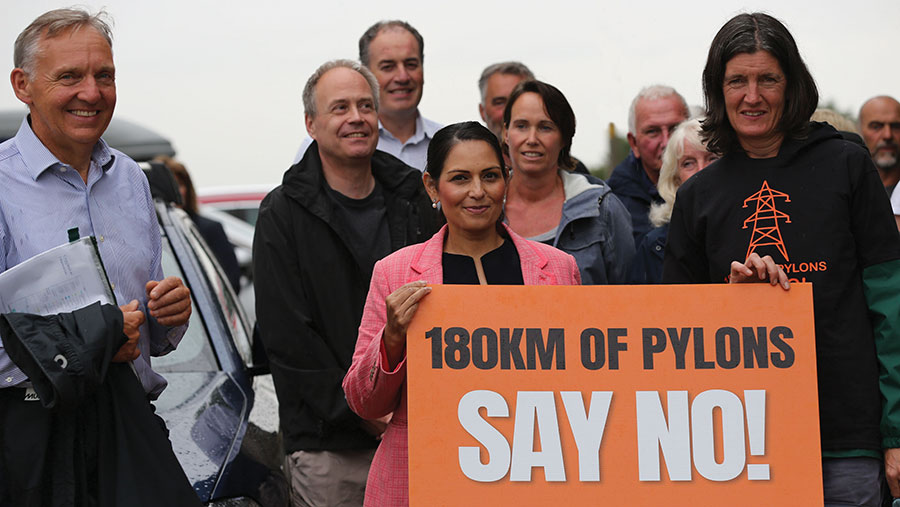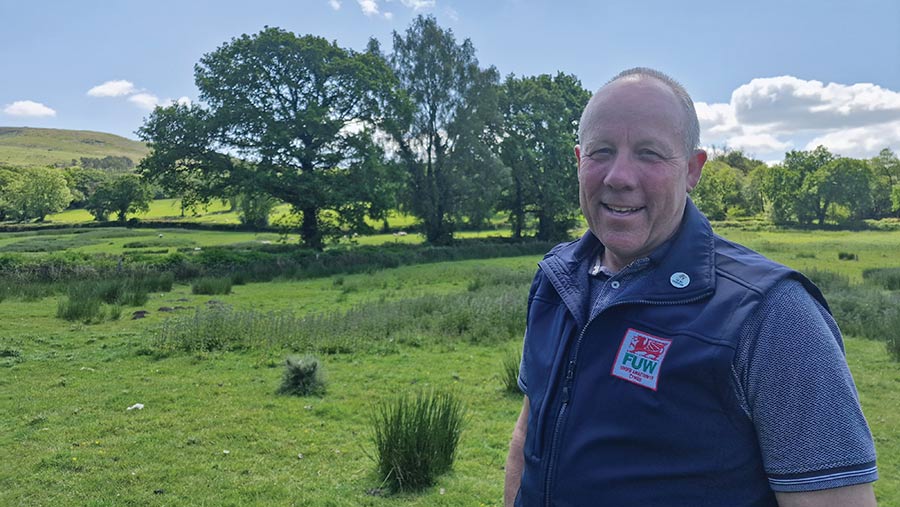How farmers face huge disruption from electricity infrastructure
 © Incamerastock/Alamy Stock Photo
© Incamerastock/Alamy Stock Photo The government is looking at ways to speed up the construction of a new electricity transmission network to meet demand in urban areas and its net-zero targets. Farmers Weekly asks how farmers will be affected.
Pylons have blighted the treasured British countryside for years, and there could soon be a proliferation in the network of these skeletal giants.
There are currently almost 22,000 pylons on the transmission network in England and Wales, but National Grid has outlined plans to install hundreds of miles of new pylons and overhead cables.
The energy company says five times more power lines need to be built over the next seven years, by 2030, than in the past 32 years to harness energy from renewables.
See also: A guide to reclaiming professional fees paid by farmers
Earlier this year, National Grid launched its Great Grid Upgrade initiative, the largest overhaul of the electricity grid in generations, which will initially involve nine major onshore projects worth a combined total of £4.5bn.
It says its upgrade is “urgently needed” to connect new green energy to the grid, to ensure homes and businesses across the country can benefit from more affordable, clean electricity and meet government’s net-zero targets.
The government has set a target to fully decarbonise the electricity grid by 2035 when all electricity should be provided by clean energy sources. This includes wind and solar and new nuclear power stations, subject to supply.
Labour leader Sir Keir Starmer has pledged “100% clean energy by 2030”.
Independent report
The UK’s Electricity Networks Commissioner, Nick Winser, an independent adviser to government, published a detailed report in August on speeding up the energy transmission infrastructure.
Mr Winser’s report included recommendations to halve the time to construct new powerlines to seven years and streamline the planning process for electricity transmission infrastructure, such as pylons and substations.
The report recommends the construction of overhead lines to transmit electricity, arguing that underground cables are too expensive and have an environmental impact.
But many farmers would prefer to have cables underground, rather than overhead, and tolerate the disruption from undergrounding for two to three years, rather than have the permanent disruption from a big 400kV pylon.
Mr Winser’s report recommends lump sum payments for individual households which are close to new lines and a community fund.
The NFU is seeking clarification on how the lump-sum payments would be calculated and whether the community fund will also be dispersed to the farming community in areas where they will be primary hosts for these new transmission lines.
“Farmers must be fully compensated for the disturbance pylons cause on a daily basis to their agricultural operations,” Louise Staples, the NFU’s senior rural surveyor, tells Farmers Weekly.
The NFU wants to see an offshore transmission network built as soon as possible to connect renewable energy from offshore wind farms and brought onto land where that energy is needed.
Norwich to Tilbury line
Currently, National Grid Electricity Transmission (NGET) is proposing to build a 114-mile overhead line from Norwich to Tilbury which would see hundreds of big pylons constructed on farms.
The NFU says the building of an offshore transmission network would avoid the need for such a long length of overhead lines and pylons on farms.
It is lobbying NGET and government to consider the undergrounding of cables as part of the transmission network.
A further 400kV overhead electricity transmission powerline is being proposed from North Humber to High Marnham. Several more similar schemes will be brought forward by NGET in the near future.
“An offshore transmission network would reduce the proposed length of overhead line, as in the Norwich to Tilbury scheme, and the amount of underground cables that are also being brought on to farms from the offshore wind farms that are being built by multiple developers out at sea,” says Ms Staples.
The NFU says NGET must properly consult and negotiate with farmers and landowners to reach agreement on hosting infrastructure, instead of using their compulsory purchase powers.
Energy regulator Ofgem says it is working with the government and electricity transmission operators to engage with businesses and consumers to “understand how they will be impacted, and to find fair ways to address this”.
But, ultimately, it says the legal rights to compensation are determined by the government, specifically the Department for Energy Security and Net Zero (DESNZ).
Farmers may also be entitled to additional compensation for losses incurred in a number of other areas – for example, crop losses, disturbance costs, the costs of any reinstatement work to repair drains, land or soil, and loss of development value.
A spokesperson for National Grid says: “We are committed to working closely, fairly, and consistently with farmers and landowners across all our projects to reduce the impact of construction on their land.
“Proposals put forward to planning authorities always consider this, along with biodiversity and impact on the landscape.”
Projects in Wales
Meanwhile, in Wales, Bute Energy is looking to build further wind farms and connect them with a smaller 132kV line from the Radnor Forest in Powys, mid-Wales, to Carmarthenshire, in a project which has been named the “Green GEN Towy Usk power line”.
The project has sparked a backlash from farmers who are requesting for the line to be built underground.
Views are now being sought over a second Bute Energy power line project, called the “Green GEN Vyrnwy Frankton connection”, which proposes to connect a new wind farm near Powys to the National Grid via Lower Frankton, Shropshire.

Bute Energy protest inn Welsh countryside © MAG/Philip Case
Case study: Farmer warns Norfolk to Tilbury power line will ‘trash the countryside’
A farmer affected by National Grid’s plans to build a 114-mile overhead line from Norwich to Tilbury fears the project will trash the countryside and seriously disrupt his farming activities.
John Rayner, owner of Upp Hall Farm in Great Tey, Essex, has been told by National Grid that pylons need to be built across his 215ha mixed farming enterprise.
The land is known locally as “God’s own acre” by virtue of its high quality, loamy clay soil and the ideal microclimate for farming.
Mr Rayner, 72, says the farm also has miles of hedgerows, trees and woods, some of which face destruction to make way for the construction of pylons and overhead power lines.
Fisher German is acting on behalf of National Grid, and Mr Rayner says they are struggling to provide answers on the correct levels of compensation and details of construction methods.
“I have hundreds of metres of mature hedges full of berries and wildlife and they want to remove lots of it to build their pylons,” he says.
“Our beautiful countryside is getting trashed to benefit foreign investors who own National Grid, but have nothing to do with this country.”
Fisher German has indicated there will be a one-off payment per pylon and per length of the wires.
But Mr Rayner says it falls way short of his expectations and needs to be renegotiated with today’s farming economics in mind. “How on earth can I be properly compensated for this loss?” he asks.
In July, former home secretary Priti Patel, Conservative MP for Witham, and Sir Bernard Jenkin, Conservative MP for Harwich and North Essex, joined local campaigners for a farm walk at Mr Rayner’s farm.
Both MPs have voiced opposition against National Grid’s plans and have urged their own government to develop the offshore grid instead.

Priti Patel supports the cause © Martin Pope/Getty Images
Farming unions
Renewable projects must work for everyone, says FUW
Farmers’ Union of Wales (FUW) president Ian Rickman’s farm comes within three miles of Bute Energy’s proposal to connect a 60-mile power line from mid-Wales through the Towy Valley, connecting to the grid in Carmarthenshire.
Mr Rickman’s beef and sheep farm will not be directly affected by the plans, but many neighbouring farms will be.
“It is a hugely controversial issue, especially in the Towy Valley. As a union, we maintain a neutral stance on renewable energy production in Wales,” he says.
“We realise there needs to be more infrastructure to supply that electricity throughout the UK. But similar to our policy on trees, we’d like to see the right renewable energy in the right place.”
For example, FUW would like to see more investment in smaller on-farm renewable projects, such as solar panels on the rooftops of farm buildings.
FUW senior policy and communications officer Gareth Parry adds: “Large projects which have an impact on farmers and landowners must work for all.
“This could include cheaper electricity for local residents, the use of underground cabling where practical and/or providing fair compensation to those affected.”

FUW president Ian Rickman © FUW
Farmers must be fully compensated for hosting infrastructure, says NFU
Farmers Weekly understands that National Grid will be seeking to pay affected farmers an easement payment (a one-off compensation payment) for the interference of the electricity infrastructure scheme, instead of an annual wayleave payment.
Currently, farmers are paid annual wayleave payments to compensate for poles and pylons on their land.
The NFU says the whole package needs to be reconsidered to ensure that farmers are fully compensated for the interference of all the transmission lines which are needed to transmit electricity to populated urban areas and meet the government’s new net zero targets.
